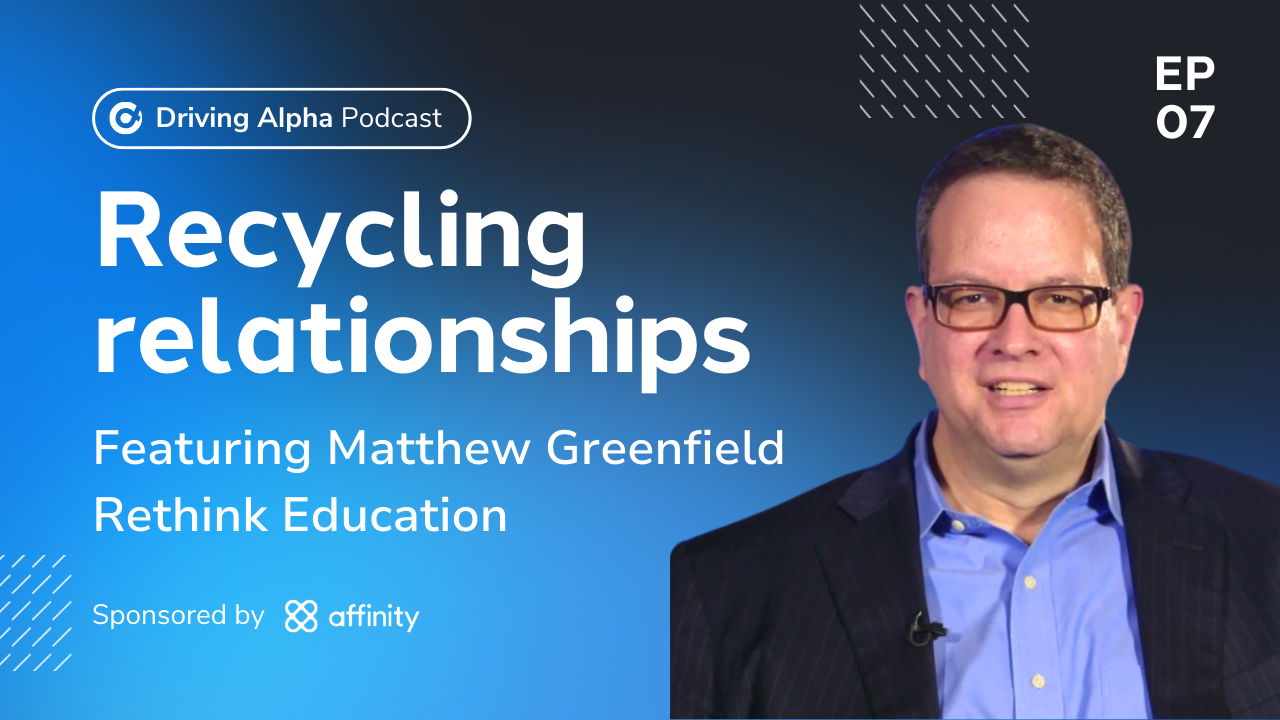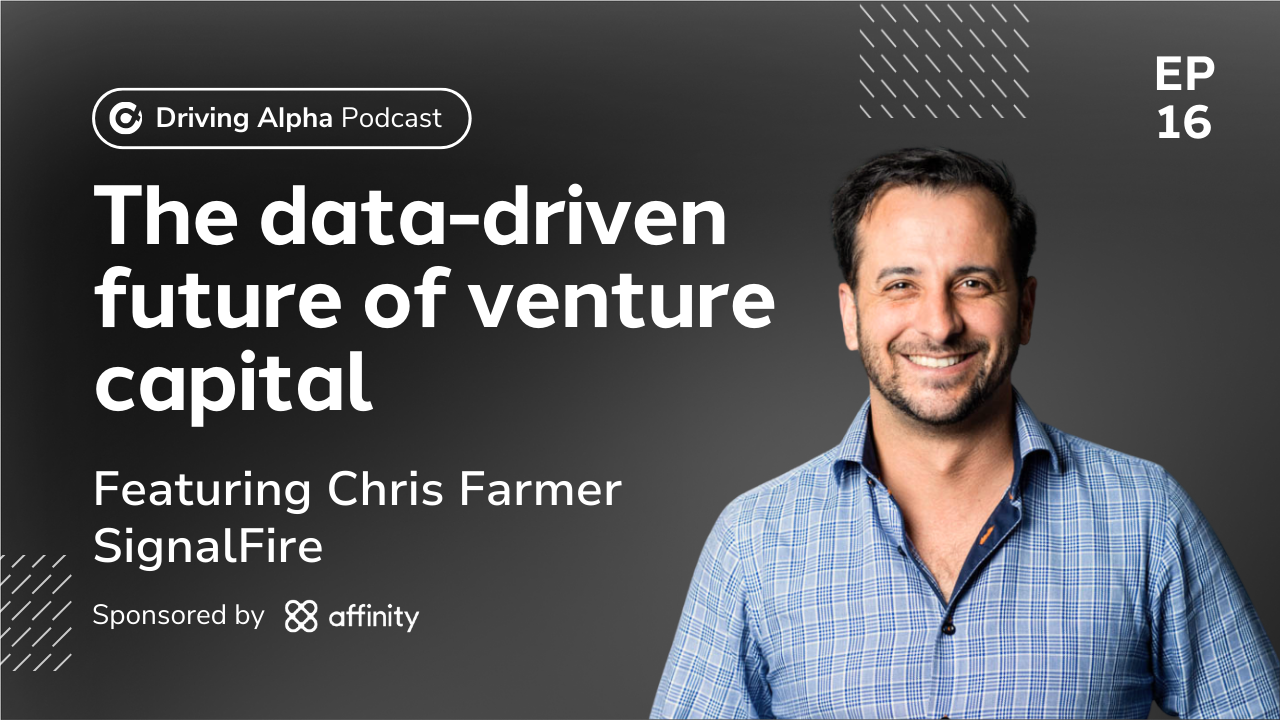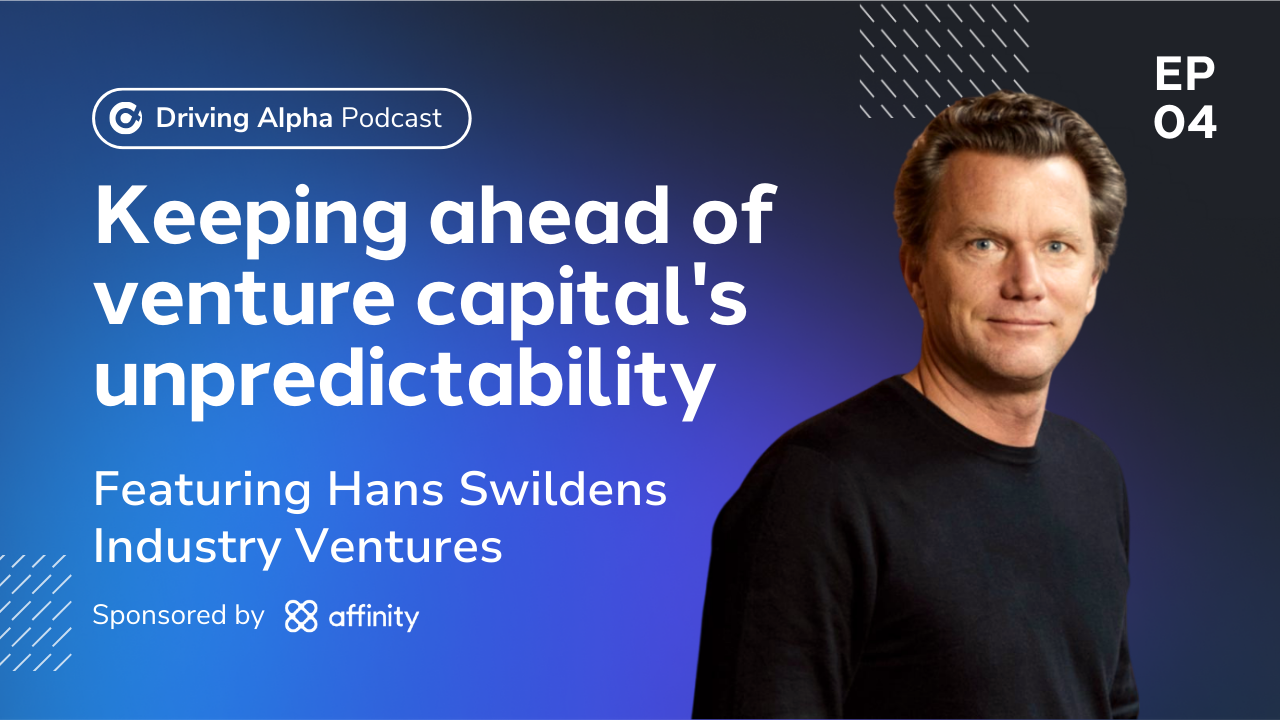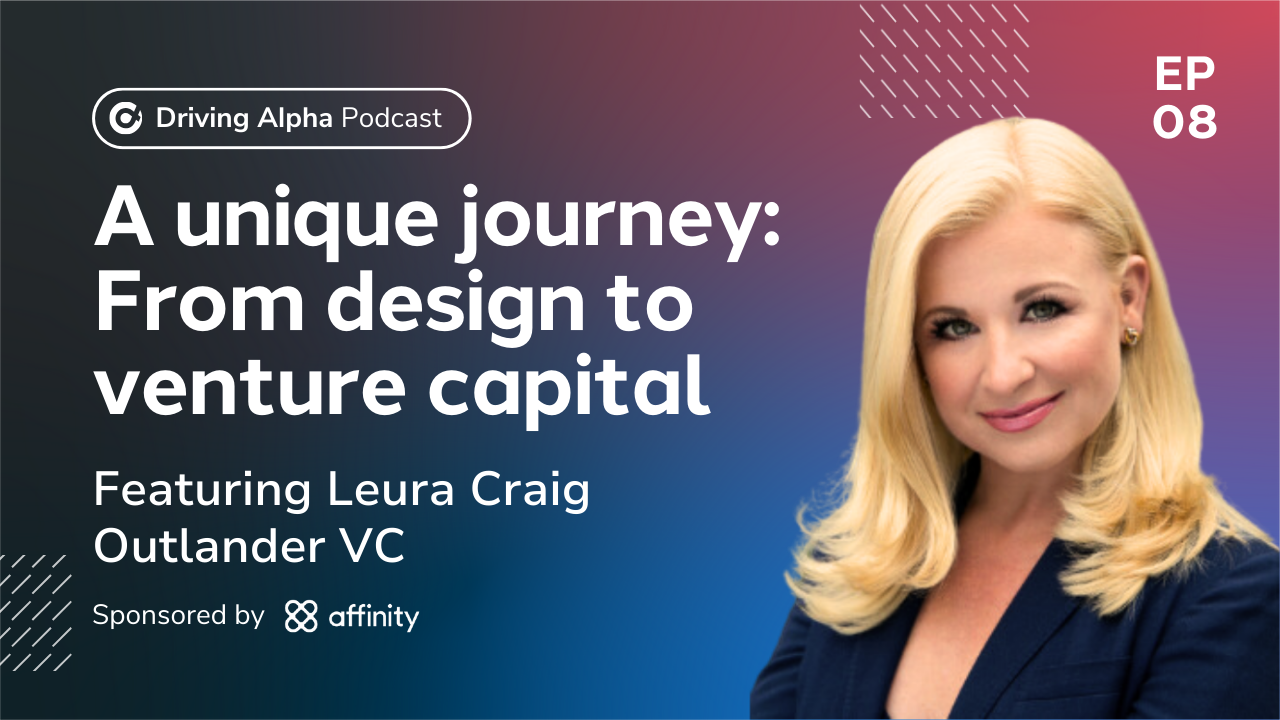Transcript
Intro: 0:00 Welcome to Driving Alpha, where we feature our friends, the outperforming investors, who demonstrate their past to Driving Alpha or outsized investment returns. We’re Alpha Partners, where we partner with 1,000 early-stage venture firms as their opportunity capital to invest in their best companies. Driving Alpha is supported by Affinity, provider of the CRM for the private capital relationship economy. Affinity knows who has the best relationship with the right startup. Affinity knows. Learn more at affinity.co/drivingalpha.
Brian Smiga: 0:43 This is Brian Smiga. I’m the co-founding partner at Alpha Partners, and this is our Driving Alpha podcast, powered by Affinity, the VC’s relationship intelligence CRM, can’t live without it. Now, today, we’re talking with my good friend Matt Greenfield about how relationships drive venture returns, how they’re essential. And Matt is the co-founding and managing partner of rethink education and impact education fund, which is part of a larger rethink capital platform in impact, venture and real estate, a $3 billion fund founded in 1981. Welcome, Matt. So Matt, we were talking a little bit before that we started that relationships maybe don’t get all the full credit they need in venture, if we start with your story of shifting from being at first a professor, then an entrepreneur, a successful one, and then a venture capital partner and founder, what was the key relationship and the origin story of Rethink Education itself?
Matthew Greenfield: 1:57 So a lot of it really comes back to my relationships with my mother and my father. My mother was a high school English teacher who worked for a while at a high school in Brooklyn that served kids from low income families, and she tried to develop specialized curricular materials for them. My father was an IBM employee for 13 years and then became one of the early venture capitalists, starting in 1970 and he was a co-founder of Oak Investment Partners, which survives today is Annie Huntress Lamont Oak, healthcare, fintech. She’s a phenomenal investor, and I’m just going to tell you a few things about my father that really had a deep influence on me. First in the 1980s there was one point at which oak employed half of the female partners in the National Venture Capital Association. Wow, which was three and basically my father and his co founder at glassmeyer didn’t know that they weren’t supposed to hire a woman until certain people, like a certain Sequoia partner and others told them that they were making a huge mistake, but they went ahead and did it anyway, and all three of those women were spectacularly successful in different ways. Second, after my father started to make a little bit of money, he became very passionate about conservation. Initially, he was giving money to buy land in our home area, Fairfield County, Connecticut. And then one day, he had an epiphany, and this is described in the New York Times article in 1989 where they interviewed him. He realized, for the price of a parking lot in Fairfield County, he could preserve 100 square miles of rainforest, Amazon Basin. And so he started partnering with the Nature Conservancy to work with local organizations to purchase land and then to protect it. And it wasn’t enough to buy the land, they had to, in many cases, change the local economy away from poaching and logging, create new skills. And the second thing was his deep thinking about social impact, or environmental impact criteria, which I think still seems noteworthy and advanced. We hear a lot of talk about tons of carbon emitted. He had two criteria, one of which was tons of biomass preserved per dollar, and the other of which was species preserved. Per dollar. And so one of his largest projects was a preserve in Bolivia, where there is a tall waterfall named after my mother’s late sister, Susanna, and where there are 584 different species of birds, which is almost as many different species of birds as you find in the entire continental United States. So it was high impact money, from the standpoint of pounds of biomass conserved, but also from the standpoint of species preservation. And so I’ve been thinking about what the right impact metrics for education are to the best of my ability, for quite a long time. So those my mother and father were deep formative influences.
Brian Smiga: 6:04 I understand you saw that leverage that your father researched, and you’re trying to, and I have been developing theses in the EdTech space about similar levers, if you will, and that’s that’s really exciting. So I’m hoping you’re going to share some of those you’ve been at this for a while. I asked you to think about maybe one of your top performing companies, and how relationships played into the discovery as they always do, the diligence and the winning of that deal.
Matthew Greenfield: 6:42 Can you share that? Yeah. So while I was still a college professor, I met an autism specialist with a PhD from Columbia, and I met her through my wife who was working with this specialist husband, who was trying to be a Hollywood producer, and she came to me because she was trying to sell a new professional development curriculum that taught people how to deliver behavioral therapy to children with autism and other special needs. And her idea was that you could democratize access to behavioral therapy, that you didn’t need a specialist with a degree in psychology and a specialized certification, you just needed to coach people through it step by step. And what she was trying to sell was essentially a large stack of paper, and she was trying to sell it to hospitals. And I said, I think you actually should maybe try to sell this to school districts, and I think it should be a software product. And she said, how would that work? So I wrote a business plan, and I had left a lot of my business relationships behind from my first business career. And so I went. I thought about trying to run this company, and decided I was too disorganized and introverted. And so I went looking for a CEO after I wrote the business plan, and the place I looked was the preschool that my oldest child was attending, and I came pretty close with one parent who was an entrepreneur, but then I found two others who really got the idea and took a grip on it. I co-founded the company with them, gave them their first financial commitment. That company was acquired by a PE firm in 2020 but has continued growing quite nicely. Today had well, they finished last year with over $110 million in recurring revenue, and are quite unusually profitable for a growing SaaS business. So they’re not yet a unicorn in today’s valuation environment, but they will be within 18 to 20 months. And so this was a set of fairly random connections that led to the creation of this company, but I was just sharing my enthusiasm for this idea with quite a lot of people.
Brian Smiga: 9:27 So you were spreading the word with lots of people. And then this company showed up with its full stack of papers trying to sell the hospital and health systems, and you helped mentor them in two directions, turn that paper into software and sell the school districts. And it turned out you were right, and that’s a really wonderful story. You’ve mentored many people, and you’ve talked about your father and mother as a mentor to you. How did you mentor this company down the road? And what. Are key relationships, introductions customers or turning points in let’s name the company, of course, and the journey of this company that got it to profitability.
Matthew Greenfield: 10:14 The company is called rethink first, and honestly, I cannot claim a lot of responsibility for their success after the foundation moment, there are definitely other companies where I have come up with names for products, have recruited key executives, including a couple of CEOs, where I have found a buyer for a company, or helped get a buyer across the finish line. So relationships matter for all of those things. I think they also just matter a lot for the generation of new ideas, right? I do not get my ideas sitting by myself, right? I get my ideas sitting at a table or on a Zoom call and talking to people, right?
Brian Smiga: 11:08 So relationships and conversations spark ideas that often neither party at the table had. And I think this is what we see is so exciting about the TED conference. This is partly what’s so exciting about venture and meeting with people smarter than ourselves who are deeply passionate and deeply expert in different fields. As you see the turnover of the many folks you have mentored at your firm and in your companies, do you see resonance going forward, where some of those mentees are helping other ed tech companies or doing new things that are exciting in the venture space. [continue to page 2]
Matthew Greenfield: 11:50 Yeah. So I think one of the secrets to being a successful venture capitalist is thrifty, recycling of people. So in my first venture career, I was primarily investing in communications equipment companies, and I helped put together one called synergetics. It was a group of engineers from what was an Apollo computer, which was acquired by HP. And cybernetics ended up getting acquired by threecom, and at its peak as a division of threecom, had over a synergetic dollars of revenue. And the way it was founded was that I went to a standards committee meeting for a new networking standard, and met teams from at least 15 different companies, all of whom wanted to lead their big company employers and start new businesses, not one of whom had ever met a venture capitalist before. This was a more innocent time, and so I lived with the founders in their homes on and off for a couple of months, helping them to write a plan and to raise their essentially pre seed and seed financing. And then, many years later, I was at the annual meeting of a venture firm that was one of the investors, and a large, burly, bearded guy came up to me with his arms open to give me a hug. And I looked at his name tag, and I said, Oh, Dave, he had been the junior most engineer on that and he was now a second time CEO. So he had been director of engineering at another startup backed by my ex boss, and then CEO of two different companies backed by him, that’s very thrifty, right? You know, I’ve always been interested in the way that a Hollywood movie, which is essentially a, you know, $50, $100, $200 million startup, can come together in a matter of months, make a terrific product and then disband. I know plenty of companies that struggle for six or nine months to hire a single key executive, much less you know 200 people. How do they do it? Well, it’s the depth and texture of the relationships, like, if you’re the director or the casting manager. You know the people you want to recruit already, and we don’t have that so much in venture capital, partly because there are just so many opportunities, and there’s a kind of atomization and dispersal. But I think if you do maintain relationships with people. One of the first edtech investments I made was a company called engraved, which managed to recruit a truly spectacularly gifted, really brilliant CTO, rather costly for the stage of the company, but he did a great job. He has now worked for. Were four different companies in the rethink portfolio at one point or another, and done terrific things for each of them.
Brian Smiga: 15:11 So one of the reasons we’re so lucky is we’re in the major motion picture business. It just happens a little more slowly in venture but to your point, though, I think there’s some really good studies, and I’ll put them in the chat below, or the comments below, where highly networked VCs outperform others. Those that build, groom, deepen, broaden and deepen their networks outperform. So being a pioneer in edtech, there’s now several great firms that your peer to tell me about your network. You know, the way you think about the network of you and your partners and your associates reaching out into the world is it? Is it mostly founder targeted? Is it who are the pools of relationships that you and your team want to know or do know.
Matthew Greenfield: 16:05 I spend a lot of time with people who are quite young, who are trying to figure out their way into education technology. And I also spend a fair amount of time with executives who are looking for their next role. And I had a discussion with someone who is a phenomenal networker himself, who said, you know, you’re not very strategic in the help you offer to people. And he mentioned another venture capitalist who is continually networking just with CEOs, governors, large LPs, right, and clearly targeting people who are in a position to help her. And it’s possible that I am doing it wrong, but I’ve been doing it long enough to see a number of people grow up and become luminaries who give me credit for helping them at a time when they were not such An obvious target for reciprocity. So I think that being a giver in Adam Grant’s terms, you should link to that book is actually not a bad strategy, as long as you don’t let it overwhelm you and prevent you from doing the things you have to do.
Brian Smiga: 17:40 Absolutely, we have a phrase at alpha. Innovation happens everywhere. And so you can’t be caddy about where you’re going to find innovation. It’s going to happen for the smallest of venture funds and an unknown founder and an idea that’s so out of the box that it’s not obvious at first, and so I think we really need to remain unbiased and open to founders, and like you said, execs that are looking for their next thing to do. So it sounds like one of your superpowers is taking a business plan and making it more efficient and providing it leverage by aiming it maybe in the right direction, gathering people to spark ideas and fostering relationships with young entrepreneurs and execs looking for their next role. These are all relationship oriented. Is there something you want to add to that list? Because these are good takeaways for any one coming into venture these days to learn from you.
Matthew Greenfield: 18:45 First, I want to offer up a sort of parable about the phenomenon you just mentioned. There are lots of stories in different cultures about a king in disguise wandering around the kingdom, and there are also stories in the Bible about angels showing up in disguise on your doorstep. And I think one point about venture capital is you just don’t know who that disguised angel or king is, and so you should be generous and kind wherever you can be with everyone at the same time, you show disrespect for people when you don’t give them honest feedback. And I have occasionally given honest feedback that has been immensely irritating or even enraging to people, right? But usually I think people appreciate honesty like they’ve been talking to dozens of venture capitalists and not getting anywhere, and they don’t understand why tell them what is on your mind.
Brian Smiga: 19:51 Yeah. I mean, I would summarize that as generally, and we adhere to this at alpha, is give more than you take, and the more you pay it forward. The more people are going to come back to you and our business model. It’s all about early stage VCs remembering to bring us their growth deal. So we try to be a super connector. Make syndicate introductions, make geographic introductions, knit people together, bring people together. But then I think there’s a nuance here about having the courage to give honest feedback, and that’s difficult. That takes a leap of courage. It’s something that I think we do too little of, and it seems like that’s it. That’s a tool in your toolkit. Well, we’re at the 20 minute mark, and I’d like to hear a little bit more before we go. If there’s one more lesson you want to share about relationships, great, but also, you know, what is the direction of Ed Tech generally, and rethink education specifically, you know, into the rest of this decade.
Matthew Greenfield: 20:51 So I haven’t talked about the fundamental mission of my firm, which is to help unlock the full potential of people from vulnerable populations. The reason why I went from Angel and accidental co-founder to venture capitalists was in part because I saw an opportunity right from Amazon Web Services and application programming interfaces and an influx of talent into the education sector, people who wanted to make a difference in the world, created an opportunity. The other thing I saw was that a lot of the venture firms that were investing spasmodically in education companies didn’t understand how people learn. Were intermittently interested in helping people from underserved or marginalized groups, but were just as ready to back companies that would give that little extra edge to the ultra wealthy and didn’t have a sympathy for people across these ecosystems, people in different roles. And so I saw a need to start a business with that focus. My firm has unusually strict social impact criteria. So for example, we won’t back a company that just serves primarily the affluent. There are a lot of companies that serve the interests of institutions, but not the interests of learners. For example, if you do lead generation for colleges, you’re not necessarily ensuring that a student ends up at the right college for that student. You’re just ensuring that the colleges that pay you end up with more students. So I feel like that need to address the actual problems, which involve actual human suffering has not diminished all that much. There’s a lot of suffering out there. There’s also a correlation with alpha right? The biggest cause of death for early stage startups is failure to find product market fit, which you could also think of as failure to find an actual problem that involves human suffering that people really care about and will pay to solve. I make lots of other mistakes, but I do not very often make a mistake back in the company that is not addressing a real human problem that is not currently being well solved.
Brian Smiga: 23:37 I think that’s wonderful. That’s the last great takeaway here for folks looking to get in venture from Matt, you heard it focus on where the pain is, where the suffering is, because you can then get product market fit, you’re solving a real need. And if you can measure the impact of technology in eliminating that pain or changing that suffering equation you’ve got, if it’s at a big enough population, you’ve got a great product market fit. I hope I summarize that Well, Matt, for you, and this has been a great conversation. I enjoyed being your friend over the last decade. I look forward to getting a deal done with you. So just in closing, this is the Driving Alpha podcast with Matt Greenfield, our guest from rethink education. And I’m Brian Smiga, the co-founder at Alpha. We invest in mid stage growth rounds. And this podcast is powered by affinity, the CRM, and we can’t live without it, so use it too. All right. There we go, and we use it too. You heard it here.
Intro: 24:45 Thanks for listening to the Driving Alpha Podcast, where we host top investors to demonstrate how they outperform the market. Click subscribe so you don’t miss future episodes. Driving Alpha is supported by affinity, provider of the CRM for the private capital relationship. Affinity knows who has the best relationship with the right startup. Affinity knows Learn more at affinity.co/drivingalpha.



